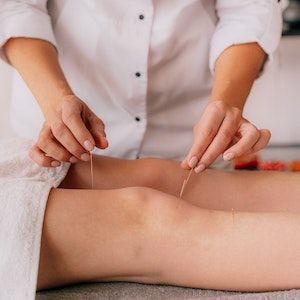Study Finds Acupuncture May Be Effective for Anxiety in Patients With Parkinson’s Disease
A study in China found that Parkinson’s patients treated with acupuncture saw reduced anxiety levels.

Research suggests that acupuncture may be a useful treatment for those with Parkinson’s disease (PD) struggling with anxiety.
In patients with PD, anxiety is associated with consistent worry, tension in muscles, a lack of concentration, and increases in tremors. Just over 30% of Parkinson’s patients report symptoms of anxiety, leading to patients having a generally diminished wellbeing.
Symptoms of anxiety are significantly associated with accelerated progression of Parkinson’s in PD patients. The study’s investigators, led by Li-xing Zhuang, PhD, and Jing-qi Fan, PhD, of the First Affiliated Hospital of Guangzhou University of Chinese Medicine, investigated the topic due in part to the dearth of information on acupuncture’s efficacy for PD.
“Acupuncture aimed at alleviating anxiety has clinical effects with good compliance. Nevertheless, we could not find data to confirm acupuncture’s utility for anxiety in PD.,” Zhuang and colleagues wrote. “Thus, we conducted this double-blinded, clinical trial to investigate the effect of acupuncture for anxiety in PD.”
Research and Methods
The investigators used a randomized, double-blind clinical trial, placing study participants into either an intervention or control group setting and having them receive clinical monitoring (CM). The intervention arm received real acupuncture (RA) and the control arm received what the researchers called ‘sham acupuncture’ (SA).
In total, 70 patients—34 women and 36 men—with Parkinson’s were recruited for the study, enrolling from June 2021 to February 2022. A total of 64 were able to complete the full intervention and 8-week follow up. PD patients were given either RA or SA for 8 weeks.
The investigators used the Hamilton Anxiety Scale (HAM-A) to score participants’ anxiety levels during the process. Their secondary endpoints included scores on the Unified Parkinson Disease Rating Scale (UPDRS) as well as the Parkinson Disease Questionnaire (PDQ-39). They also included adrenocorticotropic hormone (ACTH) and cortisol (CORT) blood serum levels measured by enzyme-linked immunosorbent assay (ELISA).
The research team calculated PD patients’ PDQ-39, HAM-A, and UPDRS scores at baseline, just after treatment, and then 8 weeks following treatment.
Study Results
The investigators reported that the RA study arm had a mean HAM-A score reduction of 4.38 (95% CI, –5.12 to –3.63; P < .001) points at baseline and that compared to the SA arm, RA group participants did not have a significant HAM-A score reduction by the treatment’s completion (0.22 [95% CI, −0.63 to 1.07]; P = .62). Despite this fact, they noted that after the follow-up meeting, RA group participants reported a statistically significant 7.03 point HAM-A score decrease (95% CI, 6.18 to 7.88; P < .001) in comparison with the other group.
The research team also reported significant changes after the 8-week post treatment follow up for the secondary endpoints of the study. At the end of treatment, there was not a statistically significant change in PDQ-39 Emotional Well-Being (EW) and UPDRS scores, but after the follow up, the RA group difference was substantially distinct from that of the SA group (UPDRS I: 3.40 [95% CI, 2.36 to 4.45]; P < .001; PDQ-39-EW: 2.13 [95% CI, 1.15 to 3.10]; P < .001).
“To our knowledge, this is the first randomized clinical trial of the effectiveness of an acupuncture treatment regimen targeted for anxiety in patients with PD,” they wrote. “There was no significant variance in the degree of improvement between the RA and SA groups after acupuncture. However, we found that 2 months after the treatment, the improvement… of the participants in the RA group was better than that of those in the SA group.”
The investigators added that anxiety in PD patients saw clinical improvement after the 8-week follow up, suggesting that the placebo effect would have disappeared over that time if in fact it had affected those in the RA group.
This study, “Effectiveness of Acupuncture for Anxiety Among Patients With Parkinson Disease/ A Randomized Clinical Trial,” was published online at JAMA Network Open.